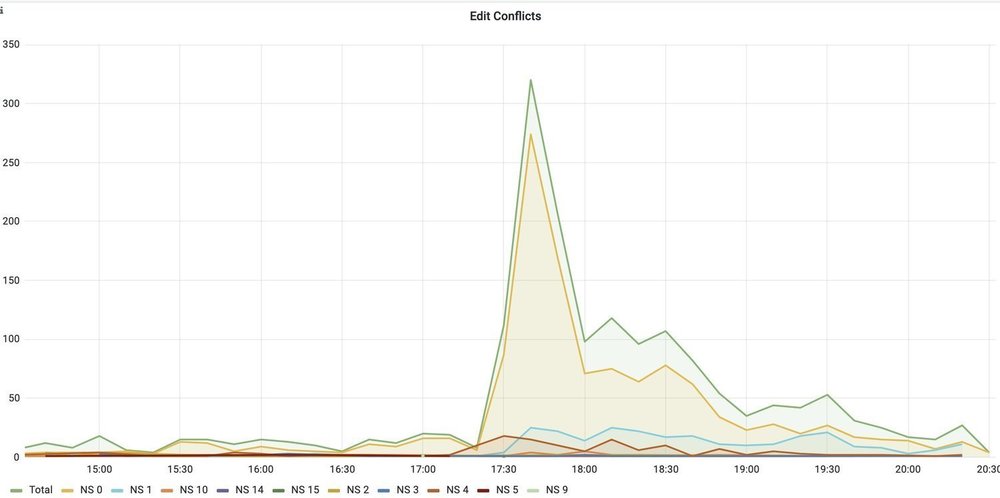What's really important?
The best work is done by teams who, frankly, give a shit about what they’re doing. If your team is showing up just to get paid, you aren’t getting the optimal results, period.
That doesn’t mean you need teams of single-minded idealists who exalt the team and company’s mission and would walk over hot coals without question if asked. Rather, it means you, their manager, need to connect their work to a purpose greater than them.
In today’s issue: how do you do that?
Queen Elizabeth II died on September 8th, 2022 after a reign of 70 years and 214 days. At 17:31 UTC on that day, reputable news sources started reporting on her death.
At 17:32 UTC, Wikipedia editor “Sydwhunte” updated the Queen Elizabeth II page to reflect her death. Their change was the first of a flurry of edit conflicts on that page.

The page was edited more than 55 times over the next 15 minutes as editors changed verbs to past tense, updated the infobox, and so on. A “task force” formed, calling themselves “WikiProject London Bridge,” specifically to undertake the “updates required due to the death and succession of Elizabeth II, and the accession of Charles III.”
It started as six people and now has 20 people on board.
We are reminded by depths of wikipedia that:
everyone is doing this for free. they just think it’s fun an (sic) important
The only reason anyone does more than the bare minimum at their job is that there is some intrinsic purpose in the work for them.
In Daniel Pink’s book, Drive, he calls it “motivation 3.0.”
The idea stems from Maslow’s hierarchy of needs. “Motivation 1.0” is the need for money to buy food and shelter, and “motivation 2.0” is incentives described as “the carrot and the stick.”
The carrot might be recognition, promotion, or a bonus. The stick might be a PIP, or being removed from a team or project, or the risk of getting fired.

But it’s “motivation 3.0” that gets a Wikipedia editor like Pi.1415926535 to submit over 35,000 edits to (mostly) Boston MBTA transit pages over the course of 16 years. They do it because to them, it’s important.
If you could build an engine inside of a person like that, and inspire them to contribute, I have no doubt that they would surprise and impress you.
Connecting someone’s work to its purpose is what James Robbins calls the second paycheck in his book Nine Minutes on Monday (one of my favorite practical management books).
Whether folks on your teams understand what their work is contributing to or not, it is your job as their manager to explicitly identify the connection of their work to the purpose; to give them their second paycheck.
To do it, Robbins suggests answering three questions:
Whom do we serve?
Who is the beneficiary of the team’s or company’s work? How detailed a picture can you help to paint of who is benefiting? Are there opportunities for your team members to have direct interactions with customers? Read their feedback? Observe focus groups?
What have we been hired to do?
Go one step deeper than the product or service. I worked for Wayfair, which sells furniture and home decor products, but just selling end tables isn’t the mission. The deeper purpose was to help people “create a home they love.”
If you worked at Hulu on transcoding or browse features, your surface-level job is to improve the customer experience in some way, but the deeper mission (according to Hulu) is “to captivate and connect people with stories they love.”
How do you make a difference?
Finally, help your team member see the straight line from the work they’re doing, no matter how seemingly trivial, to fulfilling the purpose for the customer, or to the team, or to you as their manager.
Show them how their work makes others’ lives better.
Deliver the second paycheck through an actual conversation (whether verbal, email, or Slack, it doesn’t matter). Connect their specific work to its purpose, using detailed language.
Questions for you
-
What about your job is important to you?
-
How will you connect your team’s work to a purpose this week?
-
Think of a time that you put effort into something without being paid for it. What was the real payoff for you?
Was this useful? Want more? You know what to do!
subscribeWhat would you create, if you knew you couldn't fail? I help engineering leaders achieve their impossible dreams. Learn more here.

